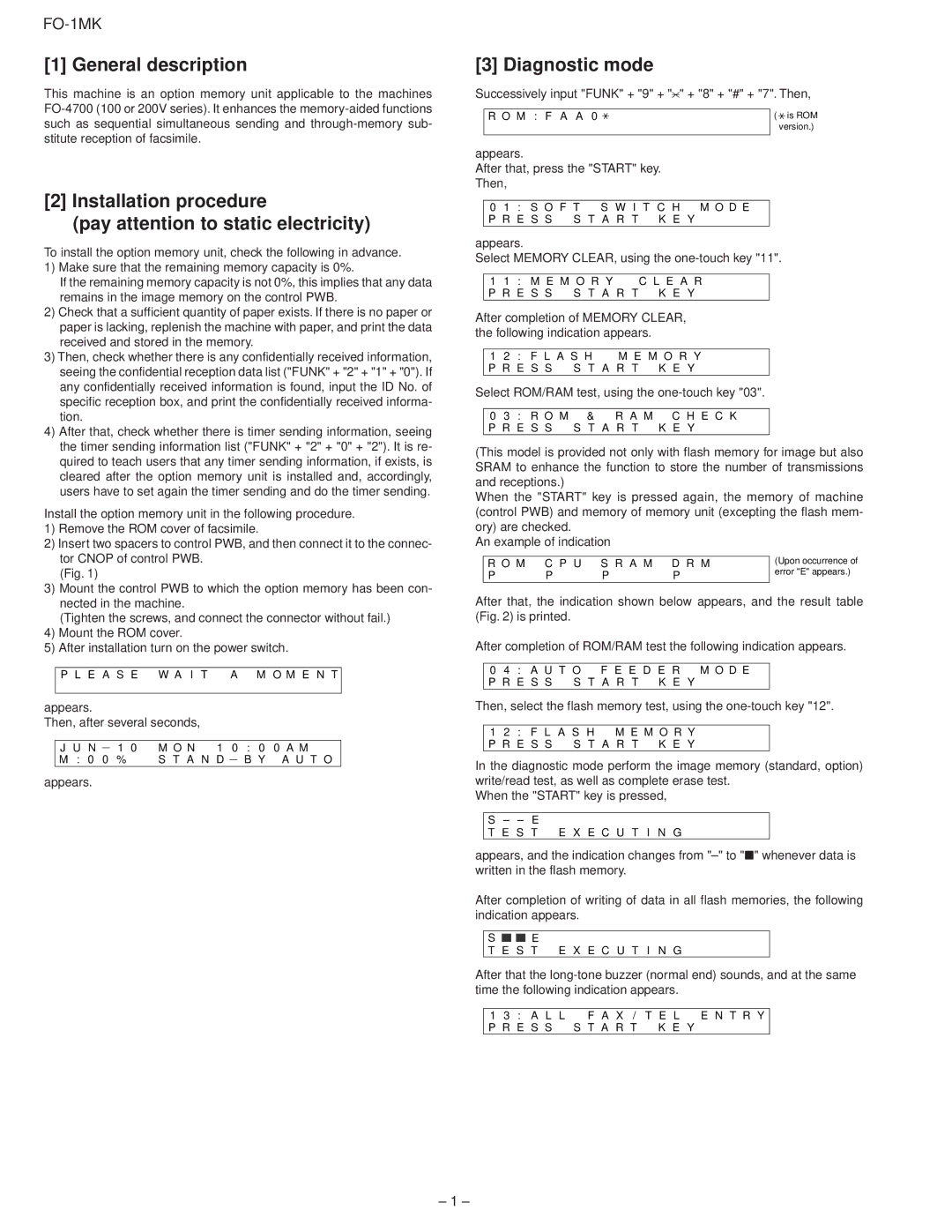
[1] General description
This machine is an option memory unit applicable to the machines
[2]Installation procedure
(pay attention to static electricity)
To install the option memory unit, check the following in advance.
1)Make sure that the remaining memory capacity is 0%.
If the remaining memory capacity is not 0%, this implies that any data remains in the image memory on the control PWB.
2)Check that a sufficient quantity of paper exists. If there is no paper or paper is lacking, replenish the machine with paper, and print the data received and stored in the memory.
3)Then, check whether there is any confidentially received information, seeing the confidential reception data list ("FUNK" + "2" + "1" + "0"). If any confidentially received information is found, input the ID No. of specific reception box, and print the confidentially received informa- tion.
4)After that, check whether there is timer sending information, seeing the timer sending information list ("FUNK" + "2" + "0" + "2"). It is re- quired to teach users that any timer sending information, if exists, is cleared after the option memory unit is installed and, accordingly, users have to set again the timer sending and do the timer sending.
Install the option memory unit in the following procedure.
1)Remove the ROM cover of facsimile.
2)Insert two spacers to control PWB, and then connect it to the connec- tor CNOP of control PWB.
(Fig. 1)
3)Mount the control PWB to which the option memory has been con- nected in the machine.
(Tighten the screws, and connect the connector without fail.)
4)Mount the ROM cover.
5)After installation turn on the power switch.
P L E A S E W A I T A M O M E N T
appears.
Then, after several seconds,
| J U N |
| 1 0 | M O N 1 0 : 0 0 A M | ||
|
| |||||
| M : 0 0 % | S T A N D |
| B Y A U T O | ||
|
| |||||
appears. |
|
|
| |||
[3] Diagnostic mode
Successively input "FUNK" + "9" + "![]() " + "8" + "#" + "7". Then,
" + "8" + "#" + "7". Then,
R O M : F A A 0 | ( is ROM |
| version.) |
|
|
appears.
After that, press the "START" key.
Then,
0 1 : S O F T S W I T C H M O D E
P R E S S S T A R T K E Y
appears.
Select MEMORY CLEAR, using the
1 1 : M E M O R Y C L E A R
P R E S S S T A R T K E Y
After completion of MEMORY CLEAR, the following indication appears.
1 2 : F L A S H M E M O R Y
P R E S S S T A R T K E Y
Select ROM/RAM test, using the
0 3 : R O M & R A M C H E C K
P R E S S S T A R T K E Y
(This model is provided not only with flash memory for image but also SRAM to enhance the function to store the number of transmissions and receptions.)
When the "START" key is pressed again, the memory of machine (control PWB) and memory of memory unit (excepting the flash mem- ory) are checked.
An example of indication
R O M | C P U | S R A M | D R M | (Upon occurrence of |
P | P | P | P | error "E" appears.) |
|
After that, the indication shown below appears, and the result table (Fig. 2) is printed.
After completion of ROM/RAM test the following indication appears.
0 4 : A U T O | F E E D E R | M O D E |
P R E S S S T A R T K E Y | ||
Then, select the flash memory test, using the
1 2 : F L A S H M E M O R Y
P R E S S S T A R T K E Y
In the diagnostic mode perform the image memory (standard, option) write/read test, as well as complete erase test.
When the "START" key is pressed,
S – – E
T E S T E X E C U T I N G
appears, and the indication changes from
After completion of writing of data in all flash memories, the following indication appears.
S ![]()
![]() E
E
T E S T E X E C U T I N G
After that the
1 | 3 : A | L | L F | A | X | / T E L E N T R Y |
P R E S S | S T A R T K E Y | |||||
– 1 –
